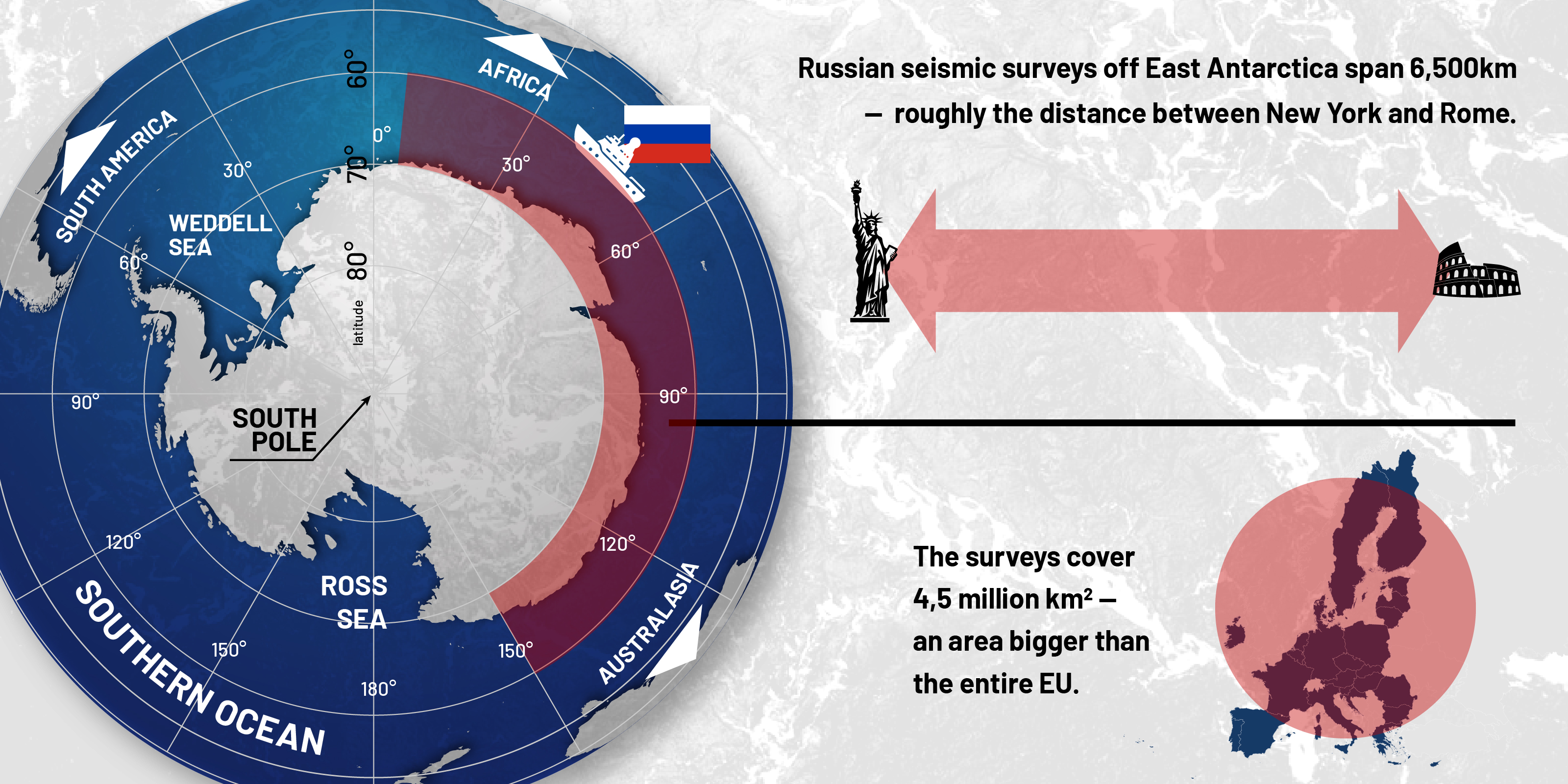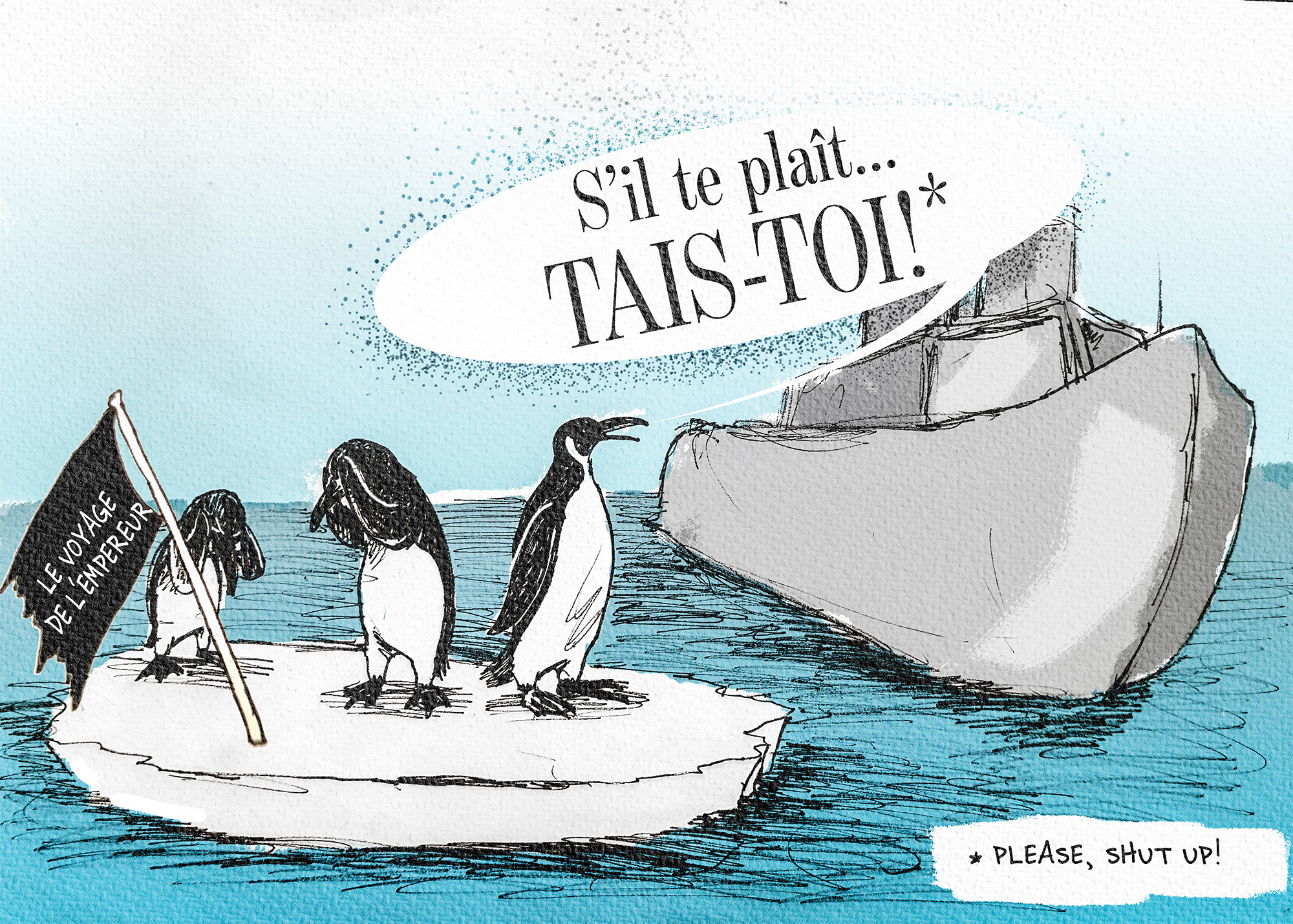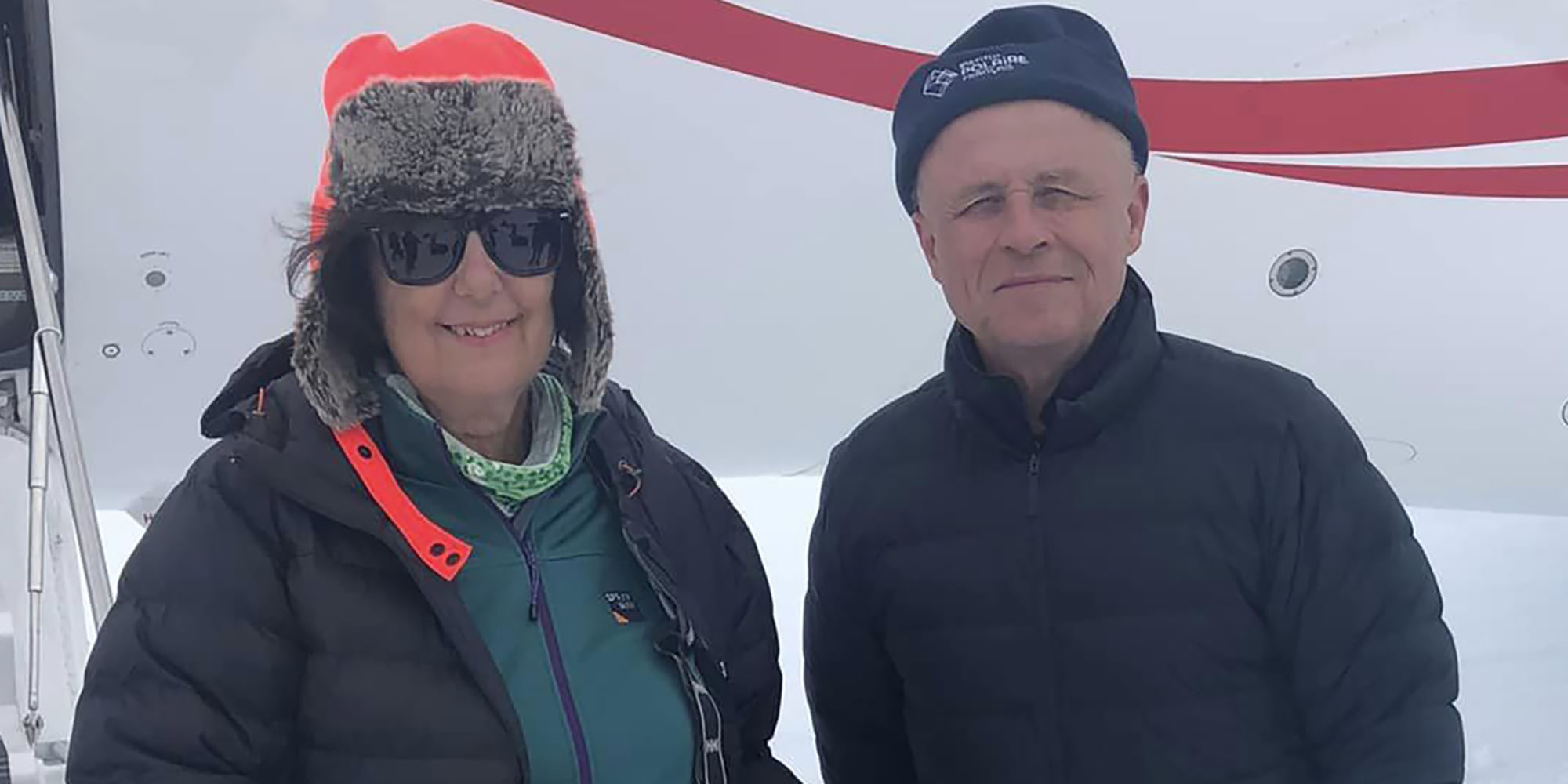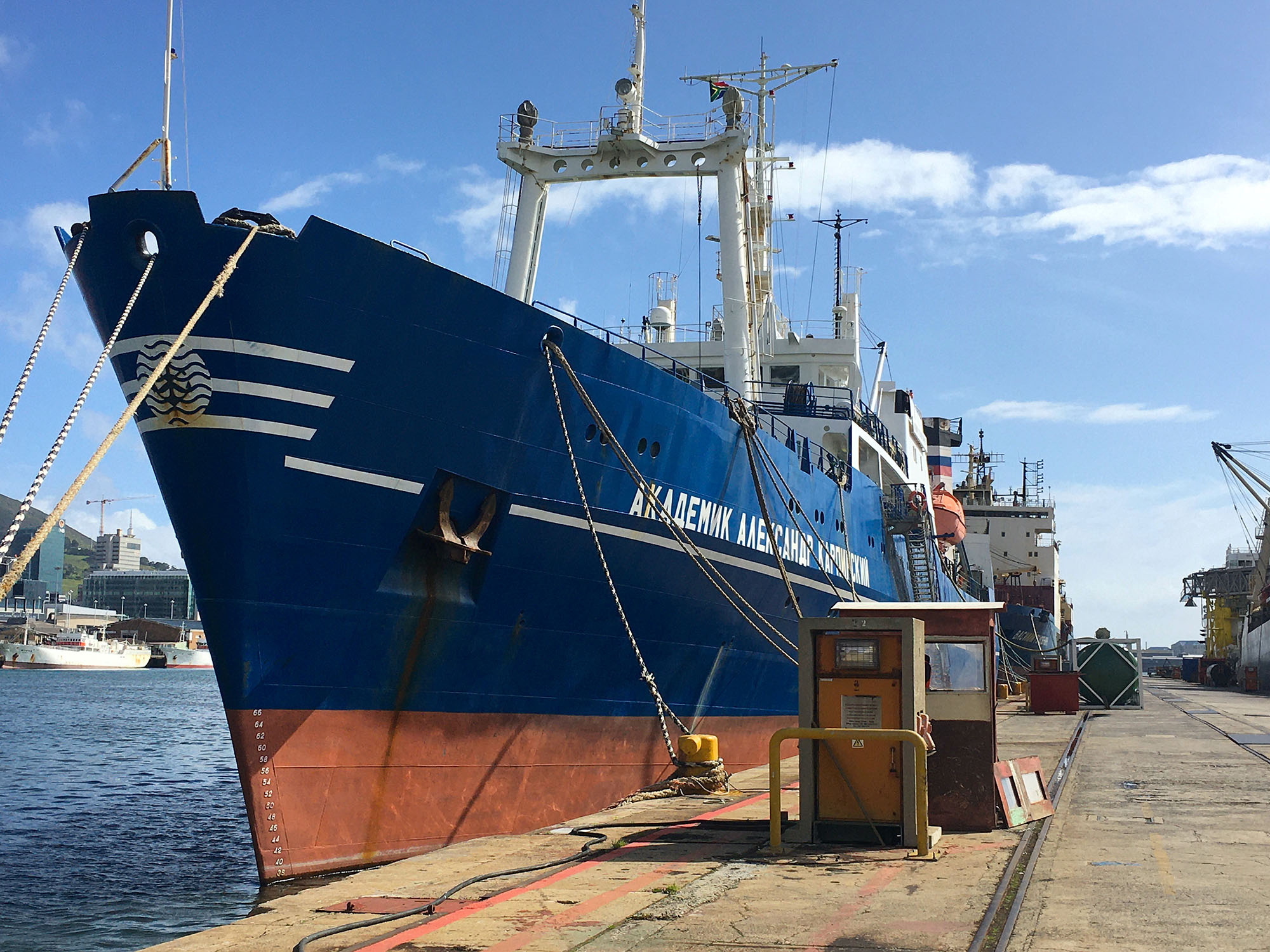Equipped with deafening airguns designed to scour Antarctica’s climate-threatened Southern Ocean for oil and gas, Russia’s flagship polar seismic vessel is set to dock in the port of Cape Town on January 26, according to ship tracker Marine Traffic.
Owned by the Kremlin’s mineral explorer, Rosgeo, the blue and white-hulled Akademik Alexander Karpinsky left her St Petersburg home port on Christmas Day. She now follows in the wake of the US-sanctioned Lady R — the Russian cargo vessel that docked at South Africa’s Simon’s Town naval base in December, controversially in the dead of night to offload potential ammunition.
As recorded in the information exchange database of the Antarctic Treaty System (ATS), the 55-nation framework that governs the great, icy south through laws such as a well-known mining ban, the Karpinsky was due to visit the Davis and Mawson seas off the Indian Ocean for “marine geological-geophysical studies” in the early 2023 summer.
But it is the December-issued annual report of Rosgeo’s Arctic and Antarctic subsidiary, the Polar Marine Geosurvey Expedition, that appears to betray the mineral explorer’s remarkably brazen intentions. The Rosgeo subsidiary describes itself as a “strategic enterprise that conducts annual research aiming to implement the geopolitical interests of Russia”. It also engages in the “search and exploration of deposits of solid minerals” in waters beyond Antarctica; and “geological and geophysical studies of the subsoils of Antarctica and adjacent seas”.
The new report, published in Russian, goes on to note the subsidiary’s research goals are “decreed” by the Kremlin and include “the creation of an information base for the assessment and scientific forecast of the mineral raw-material potential of the Antarctic”.
Last year, the subsidiary’s oil and gas investigations were led aboard the Professor Logachev, the Karpinsky’s Antarctic sister vessel, in the Weddell Sea off South America — the same ocean where Sir Ernest Shackleton’s Endurance ship was tracked down by South Africa’s polar research vessel, the SA Agulhas.
“Scientific work was successfully carried out on the geological and geophysical study and assessment of the mineral raw-material potential of the subsoil of the northwestern part of the Weddell Sea,” the report concedes. The report’s definition of success is not easy to grasp — the Logachev had run aground on the Antarctic side of the Drake Passage during these very operations.
After being refloated by the Argentine navy in early February 2022, and undergoing a hull inspection in the Antarctic gateway of Ushuaia, the dogged Logachev simply trundled back across the fierce Drake — without “significant” damage to the hull — for more of the same work.
Russia has not stopped looking for Antarctic oil and gas via Cape Town
Indeed, an exhaustive series of recent Our Burning Planet investigations shows the Karpinsky and her airguns have fired shots throughout Antarctica’s warming Southern Ocean for hydrocarbons, the building blocks for oil and gas, throughout several decades. These activities have forged ahead via Cape Town port ever since Antarctica’s mining ban became law in 1998 — which Antarctic governance experts argue allows scientific research, but not any stages of prospecting linked to commercial intent.
And the early stages of commercially weighted prospecting appear to be exactly what the Kremlin has pursued, steadily building unchallenged, detailed hydrocarbon inventories throughout the lifespan of a testable mining ban.
According to a litany of Kremlin sources, also revealed by Our Burning Planet, there are 500 billion barrels of oil and gas simmering below the Southern Ocean — a 20 million sq km aquatic wilderness that serves as an ark for a rich diversity of uniquely adapted species. None of these Kremlin sources notes how much of Antarctica’s possible supergiant oilfields may be recoverable against the region’s fiendishly stormy conditions — nonetheless, 500 billion barrels represent a civilisation-ending largesse equal to about 15 years of global oil consumption.
And, armed with guns that can blast air kilometres into the seabed to create oil and gas maps, the Karpinsky has docked in the shadows of Table Mountain since 1998, ultimately to churn out the lion’s share of seismic surveys in the Southern Ocean.
Of more than 360,000km in surveys led by other ATS member states for a range of Antarctic research, such as monitoring volcanoes and gathering climate data, Russian airguns have blasted noise across more than 100,000km of sensitive Southern Ocean seabed every 10 seconds.
 The vast extent of Russian oil and gas seismic surveys in Earth’s last unmined frontier since Antarctica’s 1998 mineral exploitation ban entered into force. (Graphic: Righard Kapp/Daily Maverick)
The vast extent of Russian oil and gas seismic surveys in Earth’s last unmined frontier since Antarctica’s 1998 mineral exploitation ban entered into force. (Graphic: Righard Kapp/Daily Maverick)
Much in the way Japan has portrayed its suspended Antarctic whale hunts as research, Rosgeo has repeatedly told Our Burning Planet its vast fossil fuels inventory is legal science permissible under the ATS.
The Kremlin’s oil and gas prospects are lately constrained by war sanctions, as well as the global shift to cleaner energies. But when we asked Russian geoscientist German Leitchenkov if sanctions changed Antarctic exposure to the possibilities of mining, he said: “I will not foresee any changed circumstances for the potential of Antarctic mining in the longer-term future.”
Leitchenkov, Antarctic geoscience head at Russia’s Research Institute of Geology and Mineral Resources of the World Ocean, in a co-authored paper suggested the ATS was a “gentleman’s agreement”.
The decorated geoscience professor told us he also worried about Antarctic environments and that, since the mining ban, scientists from different countries had published reports on Antarctica’s mineral resources.
The mining ban does not expire, but in 2048 it can be amended should just one ATS member state — hawkish powers like China and the US are among them — call for it.
South Africa and Russia — an awkward dance
Like Russia, South Africa is a 1959 founding signatory of the Antarctic Treaty, the bedrock agreement of the ATS, but the government’s polar authorities have repeatedly ignored our detailed questions on how South African port facilities may continue to enable the Kremlin’s geopolitical interests in the Southern Ocean — and the remote Antarctic continent encircled by those waters.
Also offering refuge to the Ukrainian polar research vessel Noosfera, South Africa has adopted a controversial “non-aligned” approach on Russia’s brutal war against Ukraine — where thousands of civilians have been killed since the February 24 invasion.
But, if non-alignment is formal diplomatic policy, South Africa is yet to denounce its 2021 memorandum of understanding with Russia. This seeks “to coordinate positions” at key gatherings, including annual consultative talks, and separate yearly meetings in Hobart, Tasmania — where Russia and China in 2022 used a consensus-based decision-making system to strike down marine parks for a sixth year in a row.
There is no evidence to suggest that South Africa has coordinated positions with Russia to oppose marine parks — even so, the government has no memorandum of understanding with Ukraine, which happens to chair the ATS’s hotly contested marine park negotiations in 2023 and 2024.
At the Hobart as well as Berlin’s mid-year talks, the South African delegation was notable for not joining several other ATS members walking out on Russian speeches.
‘Protest against the docking of the Karpinsky ship in Cape Town’
The Ukrainian Association of South Africa has condemned the Karpinsky’s repeated visits to South African shores, saying this flouts the ATS’s cornerstones, which devote Antarctica to scientific and peaceful use.
“Allowing Russian ship Akademik Alexander Karpinsky to continue researching hydrocarbon resources in the Antarctic goes against the principles of the Antarctic Treaty of which South Africa is part,” the association told Our Burning Planet, citing widespread environmental and infrastructural damage caused by the invasion.
Visit Daily Maverick's home page for more news, analysis and investigations
In October, Russian missile attacks across Kyiv partially damaged Ukraine’s polar headquarters — missing by metres servers holding the longest-running ozone and climate records in the Antarctic.
“The trouble is that Russia is using hydrocarbons as part of its military aggression against neighbouring states, specifically targeting the Ukrainian energy system to cause the mass suffering of civilians,” says the association. “We call on all South African environmental organisations to protest against the docking of the Karpinsky ship in Cape Town.”
Noise wars on marine life
According to senior academia, Russia’s Cape Town-enabled seismic surveys raise questions about the credibility of the ATS to protect the Antarctic against potentially unscrupulous operations — even as melting sea ice hit historic lows last year.
Also exposed by Our Burning Planet’s new series of investigations in December, Antarctic state officials charged with protecting the icy south have for some 25 years been aware of the human noise war raging below the Southern Ocean — which has likely damaged ecosystems and stressed out, injured and even killed sensitive species.
The sources of that sonic onslaught come from Antarctic seismic scientific vessels, such as at least 60,000km in profile lengths contributed by Germany’s Polarstern, which also recently passed through Cape Town; as well as the cavitating propellers, rumbling engines and piercing sonar-based echo sounders of fishing fleets.
In June, we also noted that 100,000-plus sightseers were likely to descend on the region for the first time ever in a single season — threatening to enter the already climate-stressed habitats of emperors, the world’s largest penguin now facing functional extinction in decades without drastic action. Among other marine life, blue whales, elephant seals, colossal squid and even seafloor creatures without hearing organs may suffer substantial stress and harassment when thousands of humans sail into their home every summer.
 Challenged by many stressors, the Southern Ocean and its iconic species, such as emperor penguins, may be severely affected by human-caused noise. (Graphic: Daily Maverick/Righard Kapp)
Challenged by many stressors, the Southern Ocean and its iconic species, such as emperor penguins, may be severely affected by human-caused noise. (Graphic: Daily Maverick/Righard Kapp)
There is no precautionary freeze in sight to limit these metastasising numbers — the International Association of Antarctica Tour Operators (Iaato) has passed the buck to ATS governments, arguing in an annual report it is up to them to draw a line in the snow.
“As a trade organisation,” the association “was not in a position to limit tourism trade or cap tourist numbers” — it says in the ATS’s December-issued annual report. According to the association, it already has tools “to support environmentally responsible travel”.
Airguns: ‘Not a controllable source’
“There is no question in my mind these seismic airgun surveys — regardless of use — cause considerable habitat degradation in the Antarctic, impacting many sensitive species from krill and fish to whales,” Dr Lindy Weilgart, a Canada-based marine biologist with Dalhousie University and the non-profit group OceanCare, told us. Weilgart in 2021 co-authored the first analysis on how noise from deep-sea mining might harm species.
The Antarctic and Southern Ocean Coalition, the ATS non-profit environmental observers, had tabled none other than the marine biologist’s warnings to a 2003 annual meeting attended by member states. Possible impacts on marine species included miscarriages; injury; disease; vulnerability to predation; changes in appetite; disrupted mother-calf bonds; panic; anxiety and confusion.
Major research gaps remain, Weilgart and other scientists have told us, and must be urgently closed up.
But “in extreme cases”, a pioneering review paper led by Curtin University in Perth has also noted: “Intense noise sources such as large seismic arrays or underwater explosions can cause immediate injury or even mortality, especially to smaller planktonic animals.”
“Some national research vessels are built to be very quiet,” says Russell Leaper, a whale and underwater acoustics specialist with the International Fund for Animal Welfare (IFAW). But he adds, airguns “are not a controllable source”.
So, while solutions like marine vibroseis arrays already exist, he says, airguns are “a bit like using the sound system from a large stadium for a concert in a village hall”.
Creecy of the Ice
Meanwhile, South African Environment Minister Barbara Creecy has been in East Antarctica this week, staying at Belgium’s ultra-eco Princess Elisabeth research station among other high-level diplomatic guests, including French polar ambassador Olivier Poivre d’Arvor.
On his Facebook page, Poivre d’Arvor shared a photo of himself with the snow-suited Creecy in a jaunty neon hat, noting that fellow ATS founding members France and South Africa shared marine-conservation ambitions. French president Emmanuel Macron at COP27 in Egypt called for a ban on seabed mining, but authorities in Paris did not immediately clarify France’s position on Russia’s Antarctic maritime activities.
“I will try to get back to you as soon as possible to clarify France’s position on these issues,” said Vigdis Beaussier, a spokesperson for the French embassy in South Africa. “However, I will need to forward [your] query on Russian activities in the Southern Ocean and France’s position on noise pollution to the Foreign Office in Paris as it goes beyond the mandate of our embassy.”
 South African Environment Minister Barbara Creecy and French polar ambassador Olivier Poivre d’Arvor in Queen Maud Land, East Antarctica, this week. (Photo: Ambassador Olivier Poivre d’Arvor, Facebook)
South African Environment Minister Barbara Creecy and French polar ambassador Olivier Poivre d’Arvor in Queen Maud Land, East Antarctica, this week. (Photo: Ambassador Olivier Poivre d’Arvor, Facebook)
For her part, Creecy would “have an opportunity to learn more about the first zero-emissions research station in Antarctica” while staying with the Belgians, South Africa’s environment department noted in a statement.
Belgium also uses Cape Town as its gateway.
“The Belgians have expressed their desire to sharing [sic] Best Practice to improve the environmental performance of the South African Research Infrastructure in Antarctica,” the department says, adding that a visit to South Africa’s own Queen Maud Land research station was also scheduled this week.
Neither government responded to Our Burning Planet’s questions on why South African research infrastructure appeared to be in need of environmental improvement.
They also did not respond to questions on whether Belgium’s best practice counsel to the South African government would include recommendations on how Cape Town gateway facilities might be “improved” for activities that support, rather than undermine, Antarctic conservation efforts. DM/OBP
https://www.youtube.com/watch?v=REeWvTRUpMk




 South African environment minister Barbara Creecy and French polar ambassador Olivier Poivre d’Arvor in Queen Maud Land, East Antarctica, this week. (Photo: Ambassador Olivier Poivre d’Arvor, Facebook)
South African environment minister Barbara Creecy and French polar ambassador Olivier Poivre d’Arvor in Queen Maud Land, East Antarctica, this week. (Photo: Ambassador Olivier Poivre d’Arvor, Facebook) 